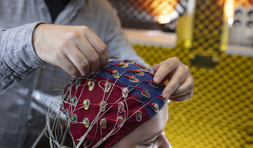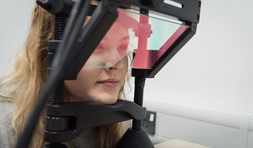Module Overview
This module aims to develop an understanding of problem formulation used in clinical psychology with a view to undertaking a comprehensive assessment. Students can critically examine a range of psychological research and theories used in the treatment, therapy and support of people with mental health problems.
The module will cover the relevant evidence for working with different psychological interventions. It aims to develop an understanding of traditional paradigms of treatment and therapy as well as examining some more recent innovations. Students will have an opportunity to expand their knowledge of problem formulation.
Module Overview
This module aims to draw on aspects of cognitive and clinical neuropsychology to examine the consequences of brain dysfunction. A particular focus will be upon the interdependence of clinical and experimental neuropsychology, and it is within this context that the role of neuropsychology in research, diagnosis and patient management can be explored.
Module Overview
This module is designed to introduce you to counselling theories and aims to help to develop introductory communication and counselling skills. A Person-Centred approach to counselling skills will be used and an important aspect of this module will be providing you with the opportunity of development of learning through self-reflection.
Module Overview
This module provides an opportunity for an in-depth study of a particular topic relevant to the field of their particular degree and to demonstrate original and critical thought. The Dissertation module tests a student’s ability to identify an appropriate research question and to design a method that allows data collection and analysis to be conducted in order to answer the proposed research question. Students will typically develop skills in scientific literacy, critical thinking, data analysis, and written and oral communication. Skills for Life will be gained in Complex Problem Solving, Critical Thinking, Curiosity & Digital & Data Literacy.
All Dissertation projects must be derived from and/or embedded within a clear theoretical framework. Students have to demonstrate their knowledge of research skills in order to analyse the data gathered and their theoretical knowledge in interpreting the results of their study in relation to the background literature. This can be done through the use of quantitative methods, qualitative methods, or a combination. The module is assessed through the presentation of their research via a poster presentation and the production of a written thesis. The role of the supervisor is to guide them through these processes and the students will be supported through a range of masterclasses covering topics aligned to the development of the students' research.
Module Overview
In this module you can explore addictive behaviours, substance abuse, and dependence in society and consider their prevalence and treatment strategies. Whether looking at individual disorders or commonalities across all disorders, you can understand the risk factors for addiction, examine the limitations of biological explanations for addiction, and evaluate the development of the field of psychological study of addictions.
Module Overview
This module specialises in presenting the psychological scientific foundations of 'intervention science' in an organisational context. It covers the process of developing interventions to investigate and address key organisational problems.
Module Overview
This module provides a critical evaluation of the way the Organisational Psychology literature approaches common workplace issues.
Module Overview
This module aims to examine the developmental disability of Autism (and Autistic Spectrum Disorders). It aims to cover a range of approaches to understanding Autism, from diagnosis and etiology.
Module Overview
This module is designed to develop understanding of body image and eating disorders. This module will typically cover their aetiology, diagnosis, assessment, and treatment in diverse populations including children, men, BAME (Black, Asian, Minority Ethnic)/POC (People of Colour) and LGBTQIA+. The module typically aims to give students an appreciation of the complicated and multi-determined field of body image and eating disorders; as well as the limitations of methodology both for clinical assessment and research paradigms. This module typically further aims to examine attitudes to eating, body shapes and sizes, their driving factors, and challenge the students to analyse and synthesise via exercises in seminars.
Module Overview
This module aims to emphasise the importance of a developmental framework for understanding how children come to exhibit adaptive and maladaptive behaviour. The module will seek to address the changing nature of problems, influences and risk factors over the course of development.
Module Overview
The module aims to introduce some of the key areas in Forensic Psychology that occur during the pre-conviction stage of a criminal investigation. Specifically, the module will focus on the police investigation and courtroom stage of the criminal process. It will explore a variety of established theoretical work and research within these domains and consider how this knowledge can be used to inform several key areas of the criminal investigation. The module will highlight the applied importance of Psychology to significant issues in the real-world.
Module Overview
This module is designed to give students the opportunity to develop a critical awareness and understanding of psychological issues typically related to the assessment, perception, communication, management and governing of risk as it affects professional practices in such areas as public health, politics, the environment, science and technology, corporate communication, and clinical/forensic psychology.
Module Overview
This module examines the potential benefits of sleep, focusing in particular on two areas. The role of sleep in memory and cognition will be explored in depth, followed by a wider examination of other benefits of sleep for well-being, which may include effects on mood, physical health and aspects of behaviour. Students will be introduced to the way in which sleep can benefit cognition and well-being and the experimental paradigms used to demonstrate this. The aims of the module are to consider in depth the potential role of sleep in both cognition and well-being, and develop the skills and knowledge that will enable the critique of the different approaches taken in this field leading to the ability to interpret and integrate current research findings and design original further research studies.
Module Overview
This module is designed to introduce the background, theories and techniques of Social cognitive neuroscience. SCN seeks to understand socioemotional phenomena in terms of interactions between the social (socioemotional cues, contexts, experiences, and behaviors), cognitive (information processing mechanisms), and neural (brain bases) levels of analysis.
Module Overview
Work experience is invaluable for undergraduate Psychology students as it has the potential to bridge the gap between academic learning and real-world applications. This module will provide you with the opportunity to enhance your practical, graduate level employability skills and insights that are not typically developed in traditional classroom settings.












